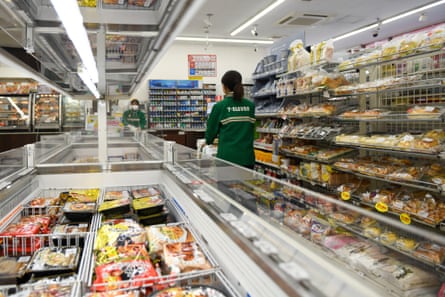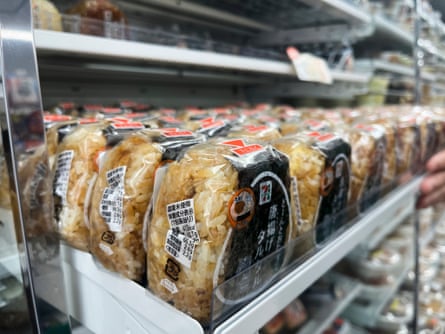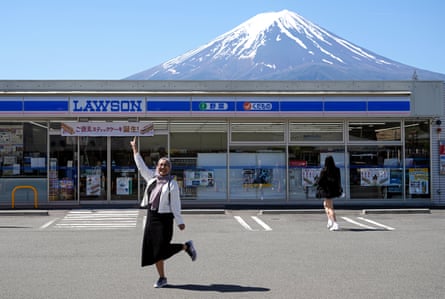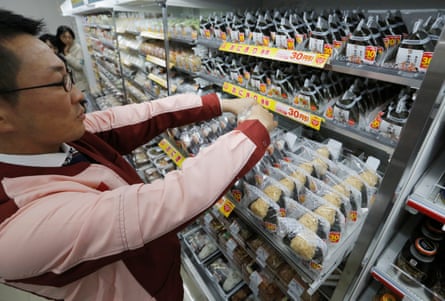Kenji Yamamoto was unsure that his business would survive when he opened Japan’s first convenience store in a Tokyo neighbourhood in May 1974. The 7-Eleven outlet he ran with his wife stocked tinned food and detergents, items that most people had previously bought from supermarkets. His first sale was a pair of sunglasses.
Half a century later, it is not only the Yamamotos’ bright red and orange uniforms that have changed. Convenience stores – or konbini – are no longer a late-night alternative to early-closing supermarkets, but a retail institution that millions of Japanese people could not imagine life without.

The tinned tuna and washing-up liquid that took pride of place on Yamamoto’s shelves have been joined by rice balls, bento, sandwiches, crisps and snacks, sweets and chocolate, fruit and veg, freshly brewed coffee, steamed buns and fried chicken, underwear, books and manga and – yes – cigarettes and alcohol.
Just as it is almost impossible to walk through a Japanese town or city without encountering a vending machine, konbini are a fixture of the urban landscape, their brightly lit frontages holding out promise of round-the-clock sustenance and polite, if functional, customer service. They inspire fierce loyalty in their customers, who will debate with friends whether FamilyMart deserves its reputation for the best fried chicken and 7-Eleven for the tastiest tamagosando – egg salad sandwiches.
Japan is home to more than 56,000 konbini belonging to seven chains in a market worth just over 11.6tn yen (£58.6bn), according to the Japan Franchise Association, up more than 4% from the previous year.
But the konbini experience is about far more than a lunchtime onigiri, an afterwork beer or a bar of chocolate to banish the late-night munchies.


This week I took up the relatively simple challenge of buying breakfast, lunch and dinner – and a nightcap – exclusively from konbini, as well as completing a couple of admin tasks. At my local 7-Eleven I bought a cup of hot coffee, a slice of french toast and a bag of sliced apple for breakfast, withdrew cash and paid an electricity bill. Had I needed to, I could have made photocopies or prints, bought tickets for a concert, sports event or theme park from a multipurpose terminal, and picked up an Amazon delivery. Or spent a penny in its spotless toilets.
As I paid for my food to eat at home, seated office workers were taking advantage of the free wifi and tucking into their breakfasts along an in-store counter, while a couple of salarymen got their morning nicotine fix behind the frosted glass of a smoking room.
Shoki Moriyama, a Tokyo company employee in his 20s, is a habitual user, dividing his loyalties between the konbini near his home and office.
“They have absolutely everything I need, and they’re open 24 hours,” said Moriyama, who spends most of his konbini outlay on bento, desserts and drinks. “The only shortage is of staff … That’s why we’re seeing more stores with self-checkout.”
The humble konbini has also become a destination for tourists, and not just for those determined to get the perfect shot of Mount Fuji emerging behind a branch of Lawson. It is not unusual to spot visitors pointing their smartphones at shelves lined with colourful bowls of instant noodles and onigiri, while an entire corner of the internet is devoted to a must-have of the konbini experience: a tamagosando.

‘The perfect fit for the Japanese lifestyle’
The march of the konbini has gone beyond Japan’s shores. Seven-Eleven Japan – now the target of an increasingly hostile takeover bid by a Canadian rival – has more than 10,000 outlets each in the US, Thailand and South Korea, and has set its sights on a total of 100,000 in 30 countries, including Japan, by the end of the decade.
FamilyMart – or Famimā to its devotees – has almost 8,000 stores in Asia, while Lawson aims to expand its presence in China to about 10,000 stores by spring 2026.
“Konbini are not only handy; they become familiar and comforting,” said Shinji Taya, a convenience store researcher with a penchant for onigiri and fried food. “And they release new products every week … It’s the perfect fit for the Japanese lifestyle.”
Taya, a daily konbini shopper whose obsession began when he worked at the headquarters of Lawson and 7-Eleven, said stores were trying hard to differentiate themselves in a near-saturated market.
“There was a time when convenience stores all looked the same, but that trend is in decline. Now operators are trying to show their true colours,” he said, adding that the next big thing would be an expansion of frozen food, including staples such as onigiri and bento.
Competition is fierce as the “big three” chains attempt to court a dwindling customer base in Japan, whose ageing population is in long-term decline, and address a chronic labour shortage. The number of stores reached a plateau five years ago, forcing operators to refine and improve their inventory, from high-end onigiri to branded stationery and clothing, and abandon the more-is-better business model that sustained them during the boom years.

That means innovation, and more products. FamilyMart’s Convenience Wear clothing line has exploded in popularity since it was introduced in 2021, with its Famimā green-and-blue striped socks worn by the former SMAP member Takuya Kimura.

The chain had sold more than 20m pairs of socks as of the end of May this year, bringing in an extra 10bn yen.
Lawson followed suit this year with socks and handkerchiefs bearing the chain’s instantly recognisable blue and pink stripes; while Lawson has been selling Muji clothing in its stores since 2022.
“FamilyMart challenges itself by breaking free from conventional thinking to consistently create things that make people think: ‘This would be great to have,’” Takehiko Sugai, who oversees the Convenience Wear range at FamilyMart, told the Kyodo news agency.

The arrival of cooler weather means konbini counters will soon be offering piping hot oden – a kind of Japanese stew. The tamagosando will continue to fly off the shelves, business travellers will buy emergency underwear and unsated drinkers will reach for a jar of One Cup Ozeki sake.
While most of my meals come from the shelves of an old-fashioned supermarket, there will always be room for another konbini perennial: a fresh-out-of the bag piece of deep-fried chicken.
“It’s crucial for shop owners to turn customers into big fans of their outlets,” Yamamoto, 74, told the Asahi Shimbun newspaper on the shop’s 50th birthday. “Customers will only come and shop at stores that keep working hard to give them what they want.”

.png) 2 months ago
17
2 months ago
17













































